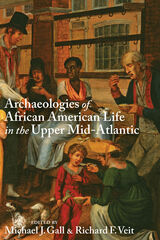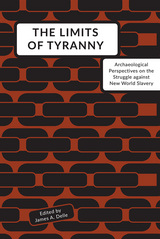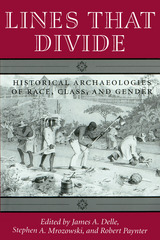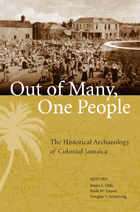4 books by Delle, James A.

Archaeologies of African American Life in the Upper Mid-Atlantic
Edited by Michael J. Gall and Richard F. Veit
University of Alabama Press, 2017
A 2018 CHOICE Outstanding Academic Title
New scholarship provides insights into the archaeology and cultural history of African American life from a collection of sites in the Mid-Atlantic
This groundbreaking volume explores the archaeology of African American life and cultures in the Upper Mid-Atlantic region, using sites dating from the eighteenth through the twentieth centuries. Sites in Delaware, Pennsylvania, New Jersey, and New York are all examined, highlighting the potential for historical archaeology to illuminate the often overlooked contributions and experiences of the region’s free and enslaved African American settlers.
Archaeologies of African American Life in the Upper Mid-Atlantic brings together cutting-edge scholarship from both emerging and established scholars. Analyzing the research through sophisticated theoretical lenses and employing up-to-date methodologies, the essays reveal the diverse ways in which African Americans reacted to and resisted the challenges posed by life in a borderland between the North and South through the transition from slavery to freedom. In addition to extensive archival research, contributors synthesize the material finds of archaeological work in slave quarter sites, tenant farms, communities, and graveyards.
Editors Michael J. Gall and Richard F. Veit have gathered new and nuanced perspectives on the important role free and enslaved African Americans played in the region’s cultural history. This collection provides scholars of the Mid-Atlantic and Northeast regions, African American studies, material culture studies, religious studies, slavery, the African diaspora, and historical archaeologists with a well-balanced array of rural archaeological sites that represent cultural traditions and developments among African Americans in the region. Collectively, these sites illustrate African Americans’ formation of fluid cultural and racial identities, communities, religious traditions, and modes of navigating complex cultural landscapes in the region under harsh and disenfranchising circumstances.
New scholarship provides insights into the archaeology and cultural history of African American life from a collection of sites in the Mid-Atlantic
This groundbreaking volume explores the archaeology of African American life and cultures in the Upper Mid-Atlantic region, using sites dating from the eighteenth through the twentieth centuries. Sites in Delaware, Pennsylvania, New Jersey, and New York are all examined, highlighting the potential for historical archaeology to illuminate the often overlooked contributions and experiences of the region’s free and enslaved African American settlers.
Archaeologies of African American Life in the Upper Mid-Atlantic brings together cutting-edge scholarship from both emerging and established scholars. Analyzing the research through sophisticated theoretical lenses and employing up-to-date methodologies, the essays reveal the diverse ways in which African Americans reacted to and resisted the challenges posed by life in a borderland between the North and South through the transition from slavery to freedom. In addition to extensive archival research, contributors synthesize the material finds of archaeological work in slave quarter sites, tenant farms, communities, and graveyards.
Editors Michael J. Gall and Richard F. Veit have gathered new and nuanced perspectives on the important role free and enslaved African Americans played in the region’s cultural history. This collection provides scholars of the Mid-Atlantic and Northeast regions, African American studies, material culture studies, religious studies, slavery, the African diaspora, and historical archaeologists with a well-balanced array of rural archaeological sites that represent cultural traditions and developments among African Americans in the region. Collectively, these sites illustrate African Americans’ formation of fluid cultural and racial identities, communities, religious traditions, and modes of navigating complex cultural landscapes in the region under harsh and disenfranchising circumstances.
[more]

The Limits of Tyranny
James A. Delle
University of Tennessee Press, 2015
The long history of slavery in the Americas has left a wealth of archaeological evidence from excavations of southern and Caribbean plantations. These excavations have largely informed our ideas of African slavery, but, more recently, scholars have also focused on northern slave sites and the various degrees of slavery pertaining not only to Africans but to Native Americans and even European immigrants as well. The Limits of Tyranny brings together nine essays that illuminate the struggles of slaves against the structure of inequality found throughout the Americas in the eighteenth and nineteenth centuries.
These essays use the concept of struggle to explore the archaeological dimensions of various sites in the Caribbean and the American South and Northeast. The actions of the enslaved, both collectively and as individuals, altered or eliminated the social forces that oppressed them. The contributors discuss the physical struggle through slave uprisings and organized rebellions and the moral struggle through historic laws and ethical behavior common in the eighteenth and nineteenth centuries. They also define the limits of oppression and use the material evidence associated with each site to determine the lengths to which slaves would go to fight their enslavement.
The Limits of Tyranny advances the study of the African diaspora and reconsiders the African American experience in terms of dominance and resistance. This volume will appeal to any archaeologist looking to move beyond the common discourse on slavery and assess more closely the African struggle against tyranny.
James A. Delle is a professor in the Anthropology and Sociology Department at Kutztown University in Pennsylvania. He is coauthor, with Mark Leone, of An Archaeology of Social Space and coeditor, with Stephen Mrozowski and Robert Paynter, of Lines That Divide: Historical Archaeologies of Race, Class, and Gender.
These essays use the concept of struggle to explore the archaeological dimensions of various sites in the Caribbean and the American South and Northeast. The actions of the enslaved, both collectively and as individuals, altered or eliminated the social forces that oppressed them. The contributors discuss the physical struggle through slave uprisings and organized rebellions and the moral struggle through historic laws and ethical behavior common in the eighteenth and nineteenth centuries. They also define the limits of oppression and use the material evidence associated with each site to determine the lengths to which slaves would go to fight their enslavement.
The Limits of Tyranny advances the study of the African diaspora and reconsiders the African American experience in terms of dominance and resistance. This volume will appeal to any archaeologist looking to move beyond the common discourse on slavery and assess more closely the African struggle against tyranny.
James A. Delle is a professor in the Anthropology and Sociology Department at Kutztown University in Pennsylvania. He is coauthor, with Mark Leone, of An Archaeology of Social Space and coeditor, with Stephen Mrozowski and Robert Paynter, of Lines That Divide: Historical Archaeologies of Race, Class, and Gender.
[more]

Lines That Divide
Historical Archaeologies Of Race, Class, And Gender
James A. Delle
University of Tennessee Press, 2000
"A truly creative, rigorous, and novel interdisciplinary collection that rethinks some of historical archaeology’s most fundamental questions."—Paul Mullins, Indiana University–Purdue University
The division of human society by race, class, and gender has been addressed by scholars in many of the social sciences. Now historical archaeologists are demonstrating how material culture can be used to examine the processes that have erected boundaries between people.
Drawing on case studies from around the world, the essays in this volume highlight diverse moments in the rise of capitalist civilization both in Western Europe and its colonies. In the first section, the contributors address the dynamics of the racial system that emerged from European colonialism. They show how archaeological remains shed light on the institution of slavery in the American Southeast, on the treatment of Native Americans by Mormon settlers, and on the color line in colonial southern Africa. The next group of articles considers how gender was negotiated in nineteenth-century New York City, in colonial Ecuador, and on Jamaican coffee plantations. A final section focuses on the issue of class division by examining the built environment of eighteenth-century Catalonia and material remains and housing from early industrial Massachusetts.
These essays constitute an archaeology of capitalism and clearly demonstrate the importance of history in shaping cultural consciousness. Arguing that material culture is itself an active agent in the negotiation of social difference, they reveal the ways in which historical archaeologists can contribute to both the definition and dismantling of the lines that divide.
The Editors: James A. Delle is an assistant professor of anthropology at Franklin and Marshall College and the author of An Archaeology of Social Space: Analyzing Coffee Plantations in Jamaica's Blue Mountains.
Stephen A. Mrozowski is an associate professor of anthropology at the University of Massachusetts–Boston, director of the Andrew Fiske Memorial Center for Archaeological Research, and co-author of Living on the Boott: Historical Archaeology of the Boott Cotton Mills, Lowell, Massachusetts.
Robert Paynter is a professor of anthropology at the University of Massachusetts–Amherst, author of Models of Spatial Inequality, and co-editor of The Archaeology of Inequality.
The Contributors: Marjorie R. Abel, Mark Bograd, James A. Delle, Terrence W. Epperson, William B. Fawcett, Ross W. Jamieson, David L. Larsen, Walter Robert Lewelling, Patricia Hart Mangan, Stephen A. Mrozowski, Michael S. Nassaney, Thomas C. Patterson, Robert Paynter, Warren Perry, Paul A. Shackel, Theresa A. Singleton, Diana diZerega Wall.
The division of human society by race, class, and gender has been addressed by scholars in many of the social sciences. Now historical archaeologists are demonstrating how material culture can be used to examine the processes that have erected boundaries between people.
Drawing on case studies from around the world, the essays in this volume highlight diverse moments in the rise of capitalist civilization both in Western Europe and its colonies. In the first section, the contributors address the dynamics of the racial system that emerged from European colonialism. They show how archaeological remains shed light on the institution of slavery in the American Southeast, on the treatment of Native Americans by Mormon settlers, and on the color line in colonial southern Africa. The next group of articles considers how gender was negotiated in nineteenth-century New York City, in colonial Ecuador, and on Jamaican coffee plantations. A final section focuses on the issue of class division by examining the built environment of eighteenth-century Catalonia and material remains and housing from early industrial Massachusetts.
These essays constitute an archaeology of capitalism and clearly demonstrate the importance of history in shaping cultural consciousness. Arguing that material culture is itself an active agent in the negotiation of social difference, they reveal the ways in which historical archaeologists can contribute to both the definition and dismantling of the lines that divide.
The Editors: James A. Delle is an assistant professor of anthropology at Franklin and Marshall College and the author of An Archaeology of Social Space: Analyzing Coffee Plantations in Jamaica's Blue Mountains.
Stephen A. Mrozowski is an associate professor of anthropology at the University of Massachusetts–Boston, director of the Andrew Fiske Memorial Center for Archaeological Research, and co-author of Living on the Boott: Historical Archaeology of the Boott Cotton Mills, Lowell, Massachusetts.
Robert Paynter is a professor of anthropology at the University of Massachusetts–Amherst, author of Models of Spatial Inequality, and co-editor of The Archaeology of Inequality.
The Contributors: Marjorie R. Abel, Mark Bograd, James A. Delle, Terrence W. Epperson, William B. Fawcett, Ross W. Jamieson, David L. Larsen, Walter Robert Lewelling, Patricia Hart Mangan, Stephen A. Mrozowski, Michael S. Nassaney, Thomas C. Patterson, Robert Paynter, Warren Perry, Paul A. Shackel, Theresa A. Singleton, Diana diZerega Wall.
[more]

Out of Many, One People
The Historical Archaeology of Colonial Jamaica
Edited by James A. Delle, Mark W. Hauser, and Douglas W. Armstrong
University of Alabama Press, 2011
As a source of colonial wealth and a crucible for global culture, Jamaica has had a profound impact on the formation of the modern world system. From the island's economic and military importance to the colonial empires it has hosted and the multitude of ways in which diverse people from varied parts of the world have coexisted in and reacted against systems of inequality, Jamaica has long been a major focus of archaeological studies of the colonial period.
This volume assembles for the first time the results of nearly three decades of historical archaeology in Jamaica. Scholars present research on maritime and terrestrial archaeological sites, addressing issues such as: the early Spanish period at Seville la Nueva; the development of the first major British settlement at Port Royal; the complexities of the sugar and coffee plantation system, and the conditions prior to, and following, the abolition of slavery in Jamaica. The everyday life of African Jamaican people is examined by focusing on the development of Jamaica's internal marketing system, consumer behavior among enslaved people, iron-working and ceramic-making traditions, and the development of a sovereign Maroon society at Nanny Town.
Out of Many, One People paints a complex and fascinating picture of life in colonial Jamaica, and demonstrates how archaeology has contributed to heritage preservation on the island.
[more]
READERS
Browse our collection.
PUBLISHERS
See BiblioVault's publisher services.
STUDENT SERVICES
Files for college accessibility offices.
UChicago Accessibility Resources
home | accessibility | search | about | contact us
BiblioVault ® 2001 - 2024
The University of Chicago Press









